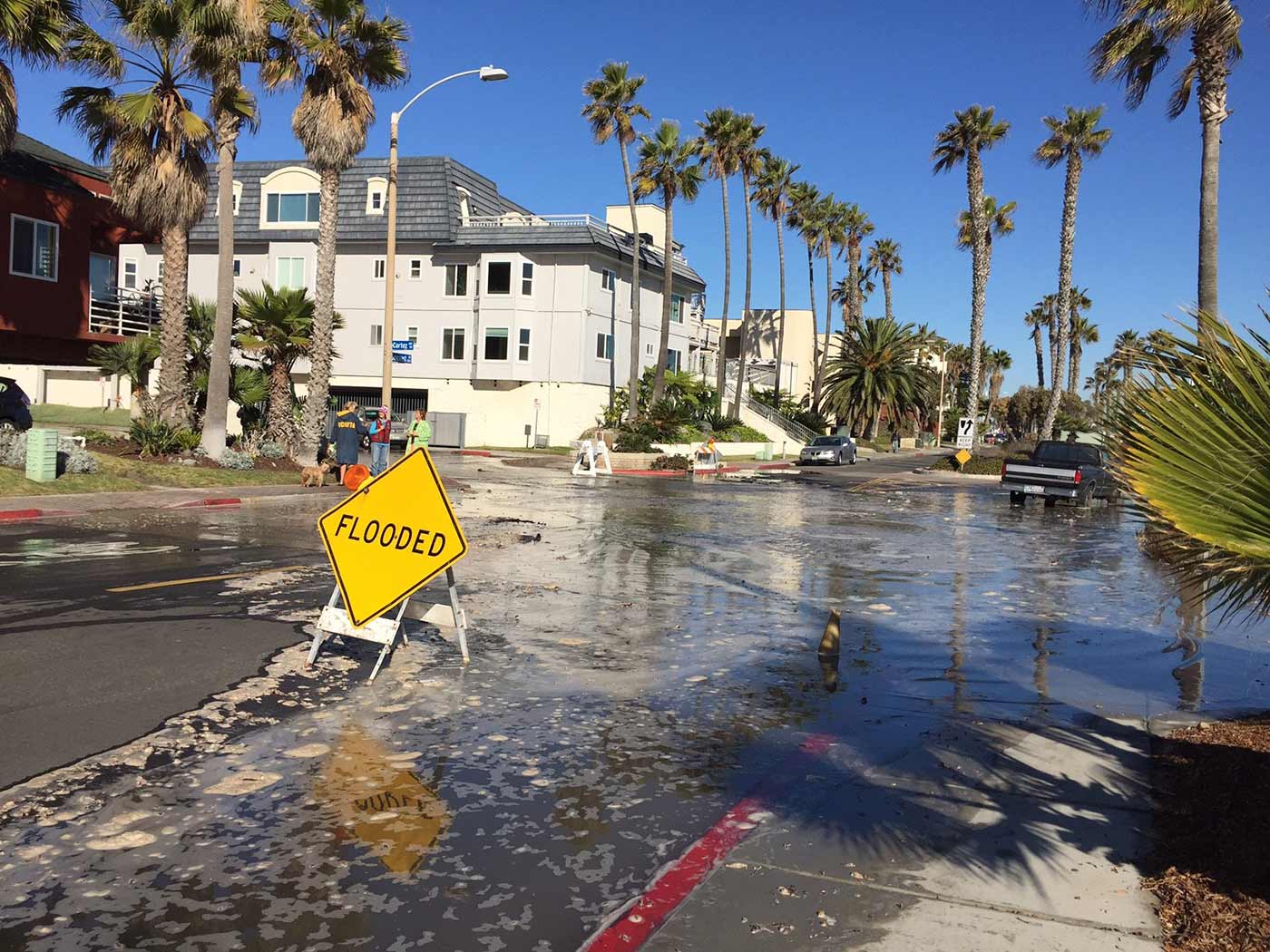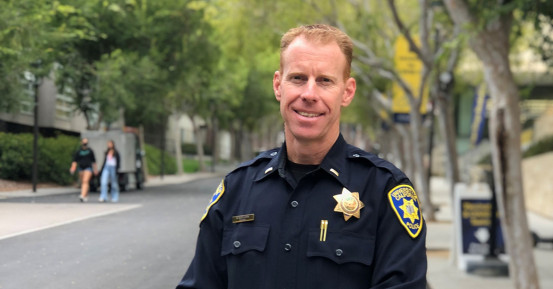By:
Published Date

Photo by Elena Zhukova for UC.
Degrees Designed to Make a Difference
College students want to make a difference, and they want good jobs. These are not mutually exclusive ambitions, and UC San Diego continues to create degree programs that speak to students’ concerns about pressing social issues and employability, too.
There are new majors, and new concentrations in existing majors, that address: issues of equity and diversity; the climate crisis; and human health and changing demographics. In almost every case, the degrees serve not only to fulfill ideals but also present a career pathway.
New in 2019-20: The Department of Education Studies is offering an undergraduate major for the first time: a B.S. in Education Sciences. The Department of Anthropology is adding a major concentration in Climate Change and Human Solutions, and the interdisciplinary Human Developmental Sciences program is adding a concentration in Healthy Aging.
There are also many new minors coming on board. Scripps Institution of Oceanography is debuting an interdisciplinary minor in Climate Change Studies, for example, and the Division of Social Sciences is adding a minor in Computational Social Science, which combines programming and data analysis with social science principles to apply them to practical problems.
Below is bit more information about some of UC San Diego’s newest majors and minors (and even notes on a couple of new master’s).
Education Sciences
The Department of Education Studies, which began in 1972 as the Teacher Education Program, has been offering teaching credentials for decades and doctoral degrees for years. It has also for years been running the campus-wide Partners at Learning program, UC San Diego’s largest service-learning program, which pairs undergraduates with local schoolchildren in underserved communities. And it has been offering minors. But Fall 2019 marks the first time that the department is offering a full-bore undergraduate major.
The new major in Education Sciences is only the third in the UC system and is the first Bachelor of Science (rather than a Bachelor of Arts) degree.
The major was launched in response to students’ growing interest in education, said Education Studies Chair Carolyn Huie Hofstetter. “More and more people are realizing that education plays an essential role in societal change to support social equity and justice,” Hofstetter said.
The explicit objective of the new B.S. in Education Sciences is “to prepare students to be impactful researchers or classroom teachers who work with diverse populations, policymakers and stakeholders to transform and create more equitable educational opportunities for systematically marginalized students.”
The interdisciplinary degree draws on the expertise of many different departments and programs in the Division of Social Sciences. It offers students three different career pathways: One prepares students to enter a credential program as an elementary school teacher. Another prepares students to seek a credential as a middle or high school teacher. And last but not least, a third prepares undergrads for careers in educational research and policy, working in government, nonprofit organizations or private research firms that focus on educational issues, interventions, outreach and policy.
Hands-on experience that bridges research to practice is a big part of the new major–and a student’s senior year will include intensive fieldwork.
“We hope the new B.S. in Education Sciences will embody our department’s commitment to innovations in research, teaching and service learning in underserved communities,” Hofstetter said. “This is our wheelhouse, and we are excited to help undergraduate students make a real difference.”
Climate Crisis
All 10 University of California campuses have joined forces with more than 7,000 colleges and universities around the globe to declare a climate emergency and commit to urgent action. Part of that vital commitment, said Department of Anthropology Chair Steven Parish, includes equipping students to address the climate crisis: “Our students, and their children, will feel the full force of climate change–their future is at stake,” he said. “And we need to give them the tools to find effective solutions.”
So, beginning in Fall 2019, Anthropology is adding a major concentration to its Bachelor of Arts degree in Climate Change and Human Solutions. The concentration offers an anthropological perspective on the frequently overlooked social and cultural processes associated with climate change.

Photo by Chris Helmer, City of Imperial Beach.
One of the key differences distinguishing the major, Parish said, is that it includes a curriculum focused on how climate change affects people and communities. “Solutions to climate change need to incorporate many dimensions of human responses if they are to be successful,” he said. “Our major will give students the knowledge, real-world skills and hands-on learning opportunities they need to collaborate with communities to design solutions that work.”
Anthropology is also offering a minor with the same focus. The minor is open to all UC San Diego undergrads.
At the same time, a new interdisciplinary minor from Scripps Institution of Oceanography at UC San Diego highlights the university’s broad expertise in understanding and responding to the challenges of climate change. The Climate Change Studies minor covers the scientific, social, political and economic dimensions of climate change. With a solutions-focused curriculum, it challenges students to develop actionable strategies, such as those around greenhouse gas mitigation, climate adaptation projects, and educational approaches. Designed to complement other disciplines, this minor is also open to students from any major.
Health – and Healthy Aging
The world’s population is aging. Not only is the number of elders increasing in virtually every country in the world but so is the proportion. Globally, in 2018, for the first time in history, according to United Nations estimates, people aged 65 and up outnumbered children 5 years old and under. Helping to prepare for that demographic reality–and fulfill the growing demand for experts in aging across different fields–are a new major concentration and a new minor in Healthy Aging.
Offered by the Human Developmental Sciences program in the Division of Social Sciences, in partnership with the Center for Healthy Aging out of the School of Medicine, the Healthy Aging major and minor will equip students across disciplines to work with the aging population in medicine, research, industry, with families, and within our communities.
Both the major and minor are designed to complement a wide variety of other majors and minors, including in business, humanities and social sciences, information technology and fine arts. And both will provide students with comprehensive opportunities including practical fieldwork–to understand the role that aging has in healthcare, technology, quality of life and well-being, age-friendly communities, senior living, architecture and aging in place.
“As one of the first undergraduate initiatives on campus focused on the aging population, we anticipate a tremendous response from students pursuing careers in health and social service fields,” said Human Developmental Sciences’ Assistant Director Clarissa Reese.

Image by iStock.com/monkeybusinessimages.
Reese noted she expects similar enthusiasm and interest for Healthy Aging as Human Developmental Sciences has seen for its recently launched minor and Bachelor of Science specialization in Equity and Diversity, which was designed in collaboration with a number of campus partners, including the Cross Cultural Center, and was launched in Winter 2019.
While not explicitly focused on aging, a new B.S. in Biological Anthropology and a new B.S. in Global Health (in addition to existing B.A.s in the fields) also speak to student interest in both health and pre-med. Global Health will soon be adding a master’s degree as well. And the Jacobs School of Engineering has just launched an MS in Bioengineering with a Medical Specialization.
More
These new degree programs (see full list at right) follow closely on the heels of successful new offerings in Real Estate and Development, Data Science, Business Psychology and Ocean and Atmospheric Sciences, as well as Data Analytics in Political Science and Speech and Language Sciences.
For all the degrees that UC San Diego offers, check out these links: undergraduate and graduate.
Share This:
You May Also Like
Stay in the Know
Keep up with all the latest from UC San Diego. Subscribe to the newsletter today.



